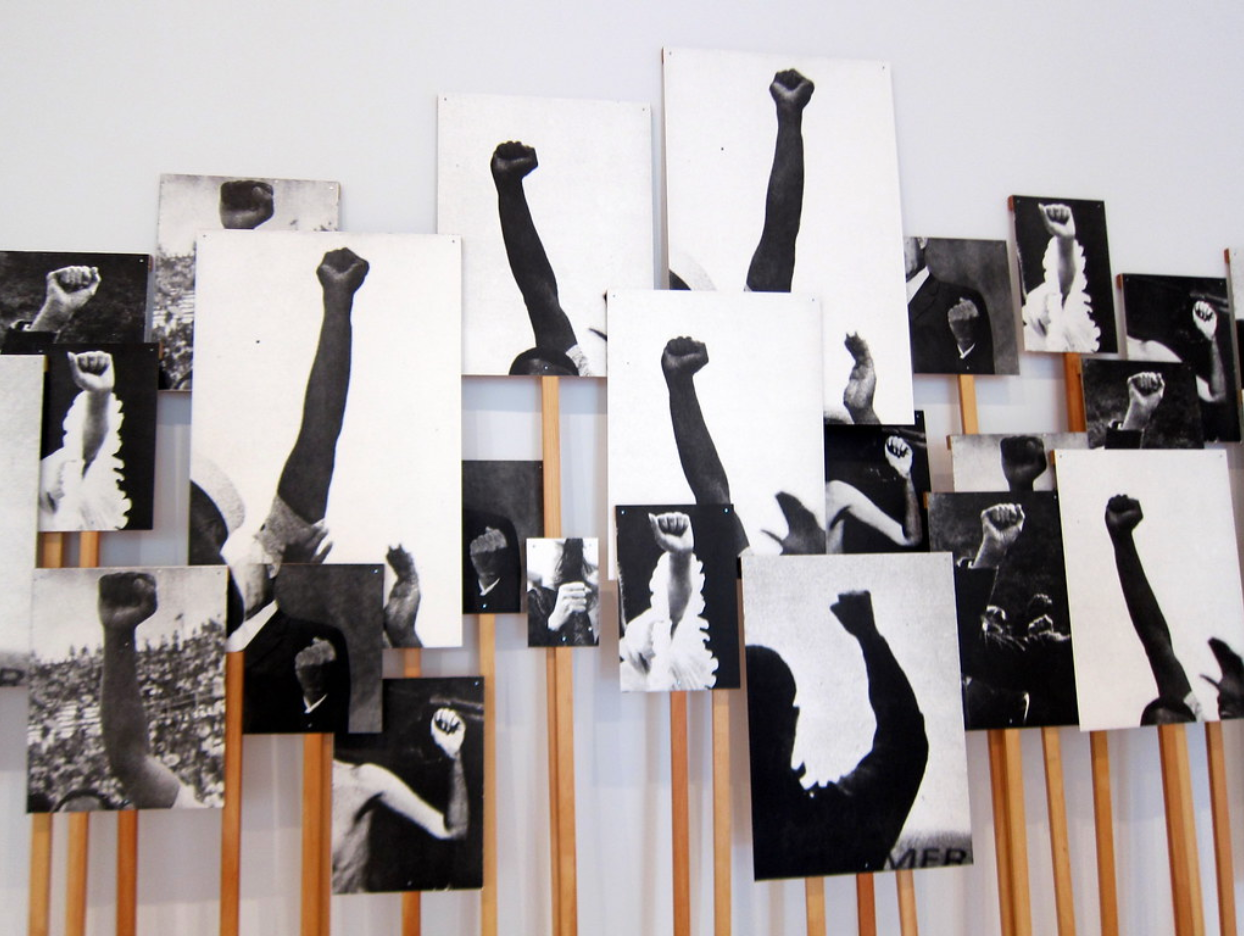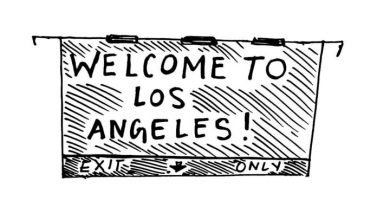The First Step Towards Justice: Acknowledging Historical Oppression

Source: “NYC – The Whitney: Left, Right, Left, Right” by wallyg is licensed under CC BY-NC-ND 2.0
Image Description: Wooden posts are attached to black and white colored photos of various people holding up the raised fist hand pose. The photos are attached to the post, resembling piket protest signs.
CW: anti-Blackness, colonization
In one way or another, most of us actively benefit from the past and current exploitation of marginalized communities. A key example of this is settler colonialism, which occurs when settlers violently remove people from their land and then proceed to exploit its resources and/or live on it. The United States of America was founded by settler colonizers who committed genocide to steal land from Indigenous comminties. While settler colonialism is often associated with European imperialism, a settler colonizer is anyone who lives on land not Indigenous to their ancestors. Therefore, those of us whose elders were not native to U.S. land profit from the previous and ongoing oppression of Indigenous folks.
Because hierarchies that aim to disenfranchise communities were built into the very foundation of the U.S., it is impossible to live in America without benefitting from the exploitation of others in some capacity. The fact that we profit from past injustices might suggest that we should actively deny ourselves the benefits gained by this exploitation. However, this line of thinking is flawed because our enjoyment, or lack thereof, does not substantially undo the systemic oppression of those whose suffering we have profited from. If all U.S college students decided to unenroll at their respective universities because they were founded on stolen land, their actions would not change the fact that the land was forcibly taken from Indigenous folks. Also, dropping out would not necessarily ensure that their university administrators would agree to return the native land to its rightful owners.
So how do we bring justice to those who have been and are still being negatively affected by past historical inequities? Before any steps can be made to make amends from past and ongoing exploitation of communities, we need to educate ourselves on these issues and continuously acknowledge them. We cannot dismantle oppression if we will not admit, or are unaware, that it exists in the first place.
Acknowledgements should be produced at a variety of levels. Institutions and organizations should recognize how those entities not only profit off of past injustices, but actively participated in systems of oppression. Individual level acknowledgements should aim to reflect on the personal privileges we have gained at the expense of another community’s suffering.
A common type of acknowledgement that is carried out is land acknowledgements, which recognize the previous owners of Indigenous lands through various mediums such as visual art, verbal statements, and written text. These acknowledgements are also usually specific to the region of land one occupies and the tribe the land belongs to. For example, a land acknowledgment made by UCLA might say that the university, “acknowledges the Gabrielino/Tongva peoples as the traditional land caretakers of Tovaangar (the Los Angeles basin and So. Channel Islands).” The purpose of land acknowledgements is to honor the original occupants of North America, who have tended to the land for centuries. They also intend to educate the audience on how they would be unable to currently live on the land if it were not for settler colonialism and the genocide of Indigenous people.
Considering America has a long history of exploiting various marginalized communities, acknowledgements can and should be made for other injustices beyond settler colonialism. These acknowledgements should remain relevant to the institutions, organizations, or individuals who are creating them. For example, an advertising agency could make an acknowledgement statement on how advertisement artists have made financial gains by historically depicting harmful stereotypes of ethnic minorities that contributed to racism. One of the longest standing racist advertisements, Aunt Jemima, perpetuates the misconception that Black women are happy to be submissive and cater to white people’s needs.
It is not enough for individuals, organizations, or institutions to have a one-time discussion on their role in oppression and then move on. Acknowledgements should be formalized as a consistent practice, even when it is inconvenient. People cannot just pick and choose when to support marginalized communities or address their harm to them. Cherry picking when to state acknowledgements demonstrates an institution’s lack of commitment to justice and desire to sugarcoat their wrongdoings to avoid public criticism.
Acknowledgement statements should be followed by actions that contribute to dismantling systems of oppression. Continuing with the advertising agency example, their acknowledgement statement could be further expanded by addressing how covert racism in advertisements is not an issue that has ended, but is still prevalent in the 2000’s. An actionable follow up could be the steps the agency is willing to take in order to reduce implicit bias in their employees, the workplace structure, and ultimately, the advertisements they create. Organizations and institutions who are truly dedicated to social justice should avoid virtue signaling or performative actions that in no way uplift marginalized communities. An example of disingenuous activism is seen through Walmart expressing support for Black Lives Matter, while also continuing to pay their workers, many of whom are Black, low wages without adequate sick leave. These performative practices allow corporations to falsely illustrate that they are standing in solidarity with communities, when in reality they are not taking any meaningful actions.
With regards to individual efforts, it is reasonable for folks to feel like they cannot significantly reduce inequities that have existed for centuries. While it may not be possible to have an influential impact on undoing structural inequality, we can all take actions that contribute to larger initiatives. Volunteering at community-based organizations, educating others on how their privileges are linked to the oppression of others, and engaging in local, state, and federal politics are effective ways to challenge systems of power. Our purchasing decisions are also incredibly important. While “there is no ethical consumption under capitalism,” we must work to do less harm to communities exploited by capitalist economies through buying clothes from thrift stores instead of fast fashion companies, creating less food waste by composting, and purchasing sustainable items such as water bottles.
If you are unsure of how to go about creating an acknowledgement here are some steps:
1. Choose a topic that is relevant to you or an institution you participate in.
For example, a gynecologist may focus on reproductive health.
2. Educate yourself and others on the various injustices within the topic at hand and then reflect on how both you and your institution or organization has profited off of the suffering or labor of marginalized folks.
The gynecologist would research the history of gynecology and unethical decisions physicians have previously made. The OB-GYN would then reflect on how the medical training and knowledge they have gained from it are tied to experiments performed on Black folks.
3. Create a written statement or another medium that explains what harms have been committed in the past by the institution, how the institution has benefited from it, and the injustices they are currently committing. Also, determine the audience of the acknowledgment.
Whenever the gynecologist’s office has staff meetings, they would start the meetings off by stating: “We want to acknowledge how the institution of medicine has contributed to racism by experimenting on Black folks without consent or compensation. Without these experiments, clinicians would not have the extensive knowledge needed to treat our patients. We also recognize how anti-Blackness is so deeply rooted into medicine and our daily lives that we have learned implicit biases that have led physicians to inadequately treat Black folks.”
4. Brainstorm actions that could be taken to address inequities that are mentioned in the acknowledgement.
The OB-GYN could implement cultural competence trainings that teach their staff about medical mistrust in the Black community. The doctor’s office could also develop trauma informed approaches to thoroughly educate Black patients of their treatment options.
Creating acknowledgements can often bring about guilt from recognizing that we have benefitted from the suffering of others. Feeling guilty is completely valid. However, it is important to not let those emotions overwhelm you because wallowing in that guilt is not only harmful to your mental health, but also does nothing to achieve liberation for disenfranchised folks. The purpose of acknowledgements is not to cause self-hate, but to learn about the privileges we have gained and how they impact our livelihood, positions in hierarchical structures, and level of involvement in political issues. Now that you are aware of those privileges, utilize them to uplift others.




